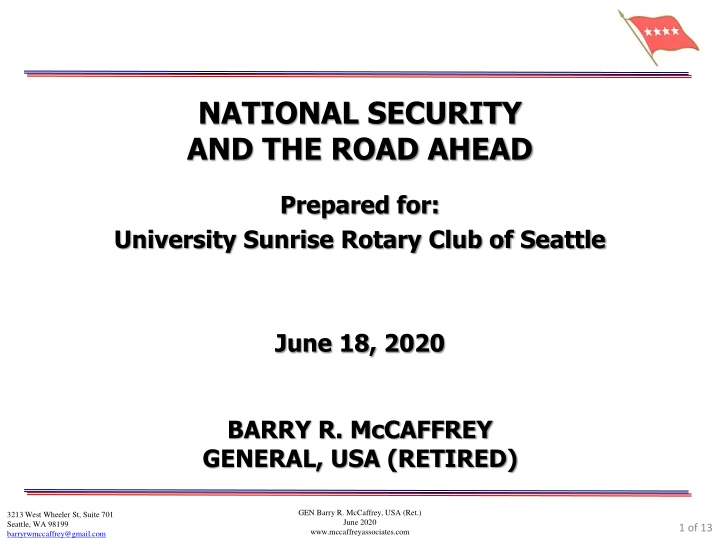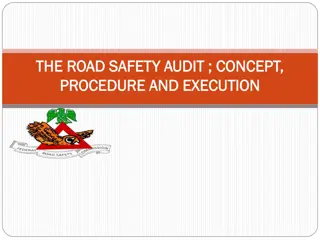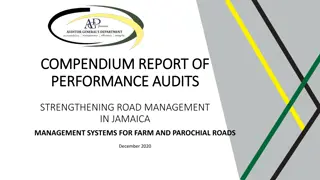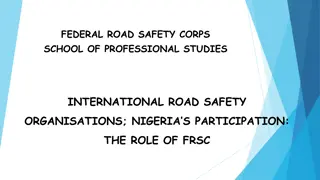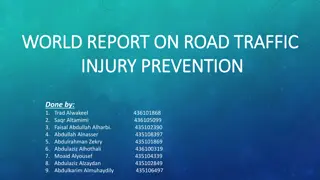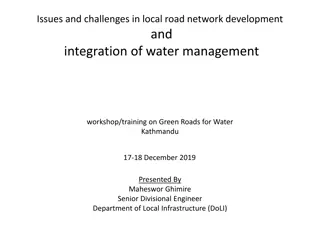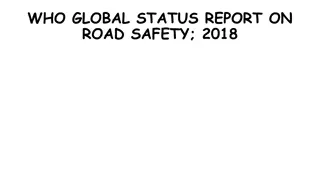National Security Challenges and the Road Ahead
General Barry R. McCaffrey, a retired four-star General, discusses long-term international security challenges including Chinese naval and air power in the South China Sea, North Korean threats, Iranian threats, Russian border expansion, cyber-threats, nuclear proliferation, international terrorism, and humanitarian crises. He highlights the complex landscape of global security issues and outlines the key areas that require attention and strategic planning for the future.
Download Presentation

Please find below an Image/Link to download the presentation.
The content on the website is provided AS IS for your information and personal use only. It may not be sold, licensed, or shared on other websites without obtaining consent from the author.If you encounter any issues during the download, it is possible that the publisher has removed the file from their server.
You are allowed to download the files provided on this website for personal or commercial use, subject to the condition that they are used lawfully. All files are the property of their respective owners.
The content on the website is provided AS IS for your information and personal use only. It may not be sold, licensed, or shared on other websites without obtaining consent from the author.
E N D
Presentation Transcript
NATIONAL SECURITY AND THE ROAD AHEAD Prepared for: University Sunrise Rotary Club of Seattle June 18, 2020 BARRY R. McCAFFREY GENERAL, USA (RETIRED) GEN Barry R. McCaffrey, USA (Ret.) June 2020 www.mccaffreyassociates.com 3213 West Wheeler St, Suite 701 Seattle, WA 98199 barryrwmccaffrey@gmail.com 1 of 13
BIOGRAPHY OF GENERAL BARRY R. MCCAFFREY, USA (RET.) General McCaffrey is President of his own consulting firm www.mccaffreyassociates.com. He also serves as a national security and terrorism analyst for NBC News. Barry McCaffrey served in the United States Army for 32 years and retired as a four-star General. At retirement, he was the most highly decorated serving General, having been awarded three Purple Heart medals (wounded in combat three times), two Distinguished Service Crosses (the nation s second highest award for valor) and two Silver Stars for valor. For five years after leaving the military, General McCaffrey served as the Director of the White House Office of National Drug Control Policy (ONDCP). Upon leaving government service, he served at West Point as the Bradley Distinguished Professor of International Security Studies from 2001-2005; and an Adjunct Professor of International Security Studies from 2006-2010. He previously served as an Associate Professor in the Department of Social Sciences from 1973-1976 teaching American Government and Comparative Politics. General McCaffrey is a member of the Council on Foreign Relations. He has served on the Board of Directors of several corporations in the engineering design, technology, healthcare and services sectors. General McCaffrey attended Phillips Academy, Andover, Mass.; and graduated from West Point with a Bachelor of Science degree. He earned a master's degree in American Government from American University and attended the Harvard University National Security Program as well as the Business School Executive Education Program. In 2015 he was selected for the Doughboy Award -- the highest honor the Chief of Infantry can bestow on any Infantryman -- for outstanding contribution to the United States Army Infantry. In May 2010, he was honored as a Distinguished Graduate by the West Point Association of Graduates at the United States Military Academy. In 2007 he was inducted into the US Army Ranger Hall of Fame at the US Army Infantry Center, Ft. Benning, GA. In 2004, Catholic University of America awarded him the James Cardinal Gibbons Medal (Highest Honor), to honor him for distinguished and meritorious service to the United States of America. In 1992 he was awarded the State Department Superior Honor Award for the principal negotiation team for the START II Nuclear Arms Control Treaty. General McCaffrey is married to Jill Ann McCaffrey. They have three married adult children and six grandchildren. Their son, Colonel Sean McCaffrey, retired from the Armed Forces after a career as an infantry officer. Their daughter Tara Larson is an ICU Nurse. Their daughter Amy McKinney is a teacher. GEN Barry R. McCaffrey, USA (Ret.) June 2020 www.mccaffreyassociates.com 2 of 13
LONG TERM INTERNATIONAL SECURITY CHALLENGES Pivot to the Pacific -- Chinese naval and air power. (The South China Sea, Japan, Taiwan.) North Korean threat to Japan and South Korea. Iranian threat to the Persian Gulf states, Iraq, Syria, Israel, and Lebanon. Russian border expansion; Ukraine, Crimea, The Baltic States, Poland. Civil war and failed states. (60,016 total US killed and wounded in Iraq, Afghanistan, and other locations). The growing cyber-threat from state and non-state actors. The continuing proliferation of nuclear, biological, and chemical weapons. International terrorism. ISIS and al Qaeda. (US cites 61 Foreign Terrorist Organizations). International crime and drug cartels. Refugees (UN Refugee Agency cites 70.8 million refugees worldwide as of 2019). Humanitarian crisis and natural disasters. GEN Barry R. McCaffrey, USA (Ret.) June 2020 www.mccaffreyassociates.com 3 of 13
SUCCESS -- ISLAMIC STATE IN IRAQ AND SYRIA Still significant threat to mid-east, Europe, and US returning fighters. Self radicalized. 5,500 US Troops currently in Iraq as part of a 60 nation coalition. 1,720 Special Ops in Syria. Primarily a Sunni-Shia civil war to re-draw the map of the Middle East. Principle threat new Iranian backed Shia terror groups. GEN Barry R. McCaffrey, USA (Ret.) June 2020 www.mccaffreyassociates.com 4 of 13
VIOLENCE IN PAKISTAN & AFGHANISTAN Afghan government (President Ashraf Ghani and CEO Abdullah) in disarray. Afghan security forces in charge. (ANA 185,300; ANP 152,600; AAF 6,600). Death toll from war in Afghanistan and Pakistan over 173,000. Currently 9,800 US Troops in Afghanistan under experienced leadership of CG, GEN Scott Miller. More than 3,518 coalition combat deaths and 20,000+ wounded in Afghanistan since 2001. (as of July 2016) GEN Barry R. McCaffrey, USA (Ret.) June 2020 www.mccaffreyassociates.com 5 of 13
RUSSIA POVERTY WIDESPREAD President Putin essentially running a criminal oligarchy. The rule of law and democracy imperiled. Russia has an economy the size of Italy. California economy bigger than Russia. Plunging energy crisis and sanctions contribute to 3.7% drop in GDP. (Real wages plummet by 10%) The International Institute for Strategic Studies estimates that Russia now only has about 845,000 military personnel on active service. 25% of Russian men die before age 55 -- average life expectancy for Russian men is age 64 (alcohol, heroin, tobacco, diet). According to IISS, Russia operating moderate strategic air (1 aircraft carrier; 1,400 combat capable aircraft) and naval forces (5 cruisers; 18 destroyers; 64 submarines - 11 carrying ballistic missiles) Russian people world class: physics, mathematics, chess, literature, ballet, and historical valor of military forces. GEN Barry R. McCaffrey, USA (Ret.) June 2020 www.mccaffreyassociates.com 6 of 13
GLOBAL US MILITARY STRENGTH (2.26 Million Military Personnel) SEA POWER TOTAL GROUND COMBAT SYSTEMS TOTAL AIR POWER TOTAL Total Aircraft 13,398 Tanks 6,287 Total Combat Ships 290 Armored Fighting Vehicles 39,223 Aircraft Carriers 24 Fighters 2,362 Frigates 22 Attack 2,831 Self-Propelled Guns 992 Transports 1,153 Destroyers 68 Trainers 2,853 Towed Artillery Pieces 864 Submarines 68 Total Helicopter Strength 5,760 Rocket Projectors (MLRS) 1,056 Corvettes 12 Attack Helicopters 971 Portable Mortar Systems 7,500 Mine Warfare 11 Total Bombers, Fighters, Attack (all branches) 4,040 Portable AT Weapons 28,000 Amphibious Assault 28 Logistical Vehicles 106,407 UAV s 882 GEN Barry R. McCaffrey, USA (Ret.) June 2020 www.mccaffreyassociates.com 7 of 13
CURRENT WORLD NUCLEAR STOCKPILES (Nuclear non-proliferation treaty signed by 188 nations) **Source: Arms Control Association armscontrol.org June 2019 GEN Barry R. McCaffrey, USA (Ret.) June 2020 www.mccaffreyassociates.com 8 of 13
GLOBAL ECONOMY COMPARATIVE GDP DATA 2019 GDP Per Capita US US China Germany Japan UK Germany Japan UK France France Italy India Russia Italy Brazil Brazil China Russia India Trillions Thousands 1 20 1 50 **All data retrieved from worldpopulationreview.com September 2019 GEN Barry R. McCaffrey, USA (Ret.) June 2020 www.mccaffreyassociates.com 9 of 13
GLOBAL ENERGY PRODUCTION AND DEMAND Crude oil production -- US at 19+ million barrels per day as of August 2019 (Saudi Arabia 9.8 million). US Net import at 9.93 million barrels per day in 2018. China hit crude oil import record 9.57 million barrels per day in January 2017. US leading global natural gas production 766.2 billion cubic meters. US oil production greatly exceeds crude oil imports since mid-2014. Production in Nigeria, Venezuela, Mexico, UK, and Indonesia decreasing. Iran exported about 100,000 barrels of oil per day in July 2019. Production in Libya and Iraq threatened by internal warfare. The U.S. could become the world's biggest oil producer by 2020, overtaking OPEC giant Saudi Arabia. International Energy Agency predicting North American oil production to dominate world-wide supply growth over the next five years due to hydraulic fracking" and shale oil recovery technologies that can access formerly inaccessible reserves. GEN Barry R. McCaffrey, USA (Ret.) June 2020 www.mccaffreyassociates.com 10 of 13
THE GROWING CYBER THREAT U.S. Director of National Intelligence ranks cyber crime as the number 1 national security threat. (Over terrorism, espionage, and weapons of mass destruction.) Expect a proliferation of attacks on cloud and cloud infrastructure. The current cyber world faces a half million security threats per minute. Internet of Things -- There were 6.8 billion connected devices in use in 2016. 30% increase over 2015. Estimated annual cost of cybercrime and economic espionage to the world economy more than $445 billion almost 1% of global income (Center for Strategic and International Studies). The single largest threat to the U.S. is China -- 70 % of America s corporate intellectual property theft originates in China. 89% of service members believe cyberterrorism to be the greatest danger to U.S. national security. GEN Barry R. McCaffrey, USA (Ret.) June 2020 www.mccaffreyassociates.com 11 of 13
A US CRISIS OF CONFIDENCE IN INSTITUTIONS 73% US Military 53% Police 38% Supreme Court 38% President 36% Religion 36% Medical System 30% Banks 29% Public Schools 23% Newspapers 18% TV News 11% Congress 0% 40% 60% 80% 20% **Source: The Gallup Organization, Poll dated June 2019 GEN Barry R. McCaffrey, USA (Ret.) June 2020 www.mccaffreyassociates.com 12 of 13
NEAR TERM INTERNATIONAL SECURITY CHALLENGES #1 RISK -- International jihadist threat (ISIS) to populations in Europe and the United States. (Paris London New York City) #2 RISK --North Korean military/nuclear confrontation with South Korea, Japan, and UN/US Forces. #3 RISK -- Aggression by a nuclear armed Iran and war in the Gulf. #4 RISK -- Pakistan implodes Pak Army/ISI lose control security of 90-110 nuclear weapons at risk. Afghanistan implodes. #5 RISK -- Chinese naval and air power confrontation with US and Asian allies. #6 RISK -- Putin Cross Border Aggression against Baltic states and Ukraine. #7 RISK Violent regime change takes place in Cuba. #8 RISK Venezuela implodes. Starvation. Economic collapse. Massive refugee exodus. GEN Barry R. McCaffrey, USA (Ret.) June 2020 www.mccaffreyassociates.com 13 of 13
